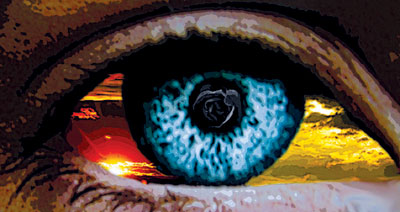All Nonfiction
- Bullying
- Books
- Academic
- Author Interviews
- Celebrity interviews
- College Articles
- College Essays
- Educator of the Year
- Heroes
- Interviews
- Memoir
- Personal Experience
- Sports
- Travel & Culture
All Opinions
- Bullying
- Current Events / Politics
- Discrimination
- Drugs / Alcohol / Smoking
- Entertainment / Celebrities
- Environment
- Love / Relationships
- Movies / Music / TV
- Pop Culture / Trends
- School / College
- Social Issues / Civics
- Spirituality / Religion
- Sports / Hobbies
All Hot Topics
- Bullying
- Community Service
- Environment
- Health
- Letters to the Editor
- Pride & Prejudice
- What Matters
- Back
Summer Guide
- Program Links
- Program Reviews
- Back
College Guide
- College Links
- College Reviews
- College Essays
- College Articles
- Back
So-Called Traditions
"Wouldn't you say it is exploitation of both sides?" Zin inquired about tourists entering traditional African cultures. The sun beat down upon my global studies class as the dust danced around my feet. Zin, a Zimbabwean street artist, displays his township art through Hata Angu Cultural Tours. The local Namibian organization arranges a Herero township visit, providing packages including traditional food, dancing, and interactions with "welcoming local residents into their humble homes"
Township tours are especially popular in Africa, acting as a way for travelers to have a "safe and happy environment for a fascinating glimpse into typical Namibian township life!" Or so the brochure claims.
Before my four-month semester abroad in Southern Africa, I would jump at any opportunity to immerse myself in new cultures. I expected to see the stereotypical poverty stricken shanty-towns and mud covered streets, with barefoot children in tattered clothing. In my mind, a township tour would allow me to experience Africa, but my ignorance would only get me so far.
When I arrived in Namibia, I looked forward to seeing the Herero women in their Victorian style gowns and San Bushmen in animal skins. When my school arranged a "living museum" tour at a Bushman community, I couldn't restrain my excitement. Now I wonder, with travelers like myself coming in to their communities, how do the local people feel about the township and village tours? In many ways, their lives are put on display like a zoo exhibit, and they are expected to put on a show for an outsiders entertainment.
Likewise, individuals expect to see the sites shown in history books throughout their vacations. They want to see the typical dances and take pictures of people in different living conditions than their own. Unfortunately for most tourists, genuine tribal communities are almost impossible to find due to culture's changing ways.
"The [San Bushmen] now wear jeans and use mobile phones. They no longer wear the animal skins," Peter explains at an educational presentation in Okanjima, Namibia. Growing up in a modern Bushman village, Peter admits to the struggle of keeping his culture alive because of government owned land, hunting restrictions, and influence of the "modern" world.
Quintessential to the Bushman as well as Herero cultures, tourism enables the restoration of the original ways of life. Bringing in a solid income through arts and crafts, traditional foods, dance performances, and educational presentations, tourism allows the continuation of culture exchange throughout generations.
Taught by his grandparents who grew up in the bush, Peter views tourism as a way to share his knowledge and history of his ancestors. He demonstrates how Bushmen lived by building fires, making traps, and showing the arrows or ostrich shells. "I like teaching about the Bushmen ways," Peter says, "only if people want to learn."
Although tourism has its benefits, it sometimes forces cultures to stay the same. When I first stepped out of the Johannesburg airport in South Africa, I was surprised by the city skyscrapers and cars speeding past. Like many tourists, I believed Africa was desolate and underdeveloped, but it was more similar to New York City than I imagined. Taking advantage of my ignorance, some locals used their ethnicity to profit off what they knew I wanted to see. By putting their culture on display, they epitomize the stereotypes placed on Africa, and represent the misconceptions I once had. Overall, there is exploitation of both sides of the interaction.
Within my first two weeks, I stumbled upon a traditional Xhosa dance. Several black men and women swayed around a fire, banging drums and singing in their native language, dressed in bright colored animal skins, fuzzy boots, and elaborate jewelry. Towards the end of the show, the performers put away their drums and took off their costumes. They returned from their car wearing jeans and t-shirts.
The performers were showing us the traditional dances their grandparents taught them, although they live in the modern world and profit off tourism. After some time, I began talking to the lead singer and discussed the misconceptions we had of each other's country.
Looking back, I realize the significance of my semester and tourism on another level. Now, I see my personal growth by acknowledging the complexity of ethno-tourism and bringing home an experience more meaningful. By discussing the history of one's culture and how that affects their lives nowadays, someone can truly experience all Africa has to offer.

Similar Articles
JOIN THE DISCUSSION
This article has 0 comments.

As a writer and photographer, I looked forward to capturing the traditional African villages, garnets, and dances. Upon my arrival I questioned whether a Xhosa dance I observed was genuine, and why the people supposedly living at a Bushman village had tattoos and farmer tans.